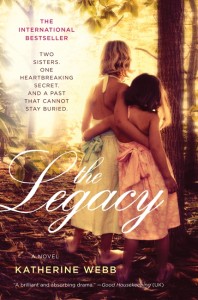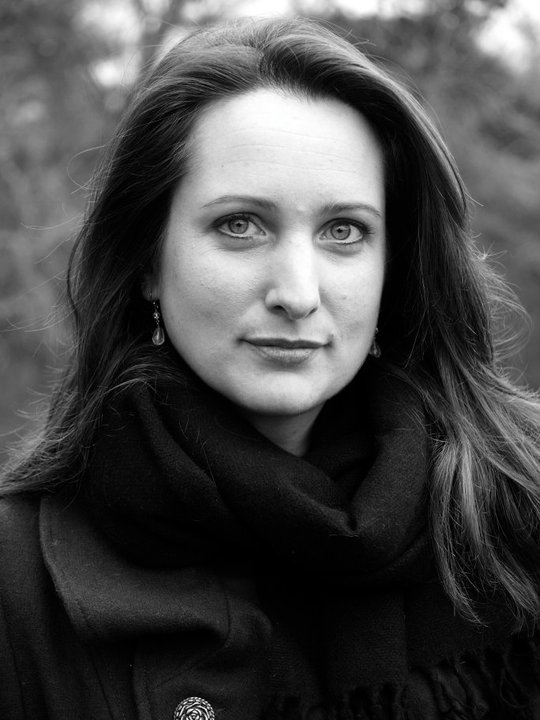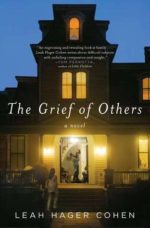 Today my special guest is Katherine Webb, author of The Legacy.
Today my special guest is Katherine Webb, author of The Legacy.
The Legacy is the story of Erica Calcott and her sister, Beth, who, as young girls, spent their summer holidays at Storton Manor in Wiltshire, England. They have returned following their grandmother’s death. But sorting through her grandmother’s belongings brings memories flooding back to Erica, particularly of the summer her cousin Henry mysteriously vanished. Erica is striving to put the past to rest, and bring peace to her troubled sister, by at long last solving the mystery of Henry’s disappearance. In doing so, Erica discovers family secrets, including two shocking acts of betrayal . . . and their heartbreaking legacy.
The Joy of Research
My debut novel, The Legacy, recently came out in the United States, and I have been keeping an avid and slightly anxious eye on the blogosphere. Happily, most of the reviews have been fantastic, and a couple have contained comments which meant a lot to me – the reviewers were struck by my descriptions of Oklahoma Territory. One was taken back to her childhood in South Dakota; another had family in Woodward County, and remarked how well I had captured the heat and landscapes of the region. The reason for my joy: I have never been to Oklahoma.
In his novel Widow for One Year, John Irving made the point that the job of a novelist was to imagine – that anybody could research and find things out, but that only a novelist could conjure these things from raw imagination. This has always stuck with me as part of a greater inner debate I have whenever I hear that old chestnut “write what you know”. If novelists only ever wrote what they knew, I think a lot of fiction would be pretty dull! Do I know what life was like for a woman in 1905, constrained by the need to secure a future when opportunities to support yourself were desperately limited? No. Do I know what it’s like to lose a husband, or see a sister suffer from depression, or raise a child? No, but I can imagine. Perhaps more importantly, because I know my characters so well I can imagine what these things would be like for them.
But to this I must add my outrage towards a fellow author a few years back. I was a member of a writing group which held a twice-yearly short story competition. That summer, the theme of the competition was a story set in Newbury, the town where we were based. One story set the lives of its characters against a backdrop of the long history of the town – its eras of wealth and decline, its war years and modern development. I was fascinated, and marked the story highly, thinking I had learnt something about my home town. Not so. The author blithely admitted that he had made it all up – none of it was based on research, and nothing he had described had actually happened to Newbury. I was, as I said, outraged.
So there is clearly a balance to be struck. If you want to write about a specific place rather than an imagined one, you had better make sure you get your facts straight. If you want to write a historical period, then likewise, the whole story will lose authenticity if there are anachronisms scattered throughout the text, or your characters behave in a way that would have been unheard of at the time. I was slightly nervous about setting a story in the United States – I had been told that American readers are sometimes quite hard on books with American settings written by non-American writers. I never quite believed it, but then . . . there was the unavoidable truth that I had never been to Oklahoma to contend with.
In 2003 I took a road trip from Alaska to Mexico, crammed into a van with twelve strangers. It was the best holiday I have ever been on, and it inspired me to set The Legacy in the States. The vast vistas of the plains and the Rockies; the sky that seemed bigger than any English sky; the lonely stretch of the desert in the southwest. I was struck by how friendly and welcoming the American people were, when British tourists sometimes get short shrift abroad; and was also lucky enough to meet some Native Americans, from the Crow and Navajo tribes, and hear a bit about their history. All of this really caught my imagination, and stuck with me. I could hardly imagine what it must have been like for white families setting out into such vast, wild landscapes carrying everything they owned and with nothing to go back to. I could hardly imagine what it must have been like for the existing population to see them coming. Plainly and simply, I wanted to write a western.
Because, in The Legacy, I wanted Erica to have childhood memories of her great grandmother, Caroline, I couldn’t therefore have Caroline living in the mid nineteenth century, when the exodus into the west was at its peak. She needed to be a young woman at the beginning of the twentieth century, and since I wanted her to experience an “untamed” land, I chose Oklahoma Territory as my setting – because it had been set aside for the native population for many years, there was still relatively little white settlement there. Once I had this setting, I did everything I could to find out about the area, and about life in Woodward at the time.
Perhaps the historian in me emerges at such times – I have a degree in History and I love to do research like this. I love to learn about things I had no idea about previously. Perhaps I go into greater detail than I need to – for example, the saloon in Woodward that Hutch visits really was called the Dew Drop Inn; but I’m sure nobody would have minded if I’d given it a made-up name. I read first-hand accounts of living in Woodward at the time which described the beauty of the harsh country, the troublesome climate and the hardships – from sand in your shoes to gypsum in the ground water. By the time of writing the novel I may not have known what it was like to live there back then, but I certainly could imagine it.
The past may be another country, but a hundred years is not such a long time; so while a historical setting gives a writer more scope to take liberties with the particulars of a certain place, people who know that place won’t be fooled. So, in hearing that people with ties to Woodward, to Oklahoma and to the Midwest have been favorably struck by my representation of the setting, I can exhale! I’m sure I haven’t got every last detail correct, and some readers will find things that don’t sit right with them; but at least I know I did everything I could to hit the right balance between research and imagination. And I can’t wait to actually come out and visit the Midwest – I really want to see where Caroline lived! Unlike her, I can ride a horse; and one day I plan to go for a gallop under those huge skies.
Meet Katherine

Katherine has held a variety of jobs including waitress, au pair, personal assistant, potter, bookbinder, library assistant, and formal housekeeper at a manor house.
Happily, Katherine now writes full time. In addition to The Legacy, she is also the author of The Unseen, which is set in 1911 Berkshire, England, and full of romantic passion and murder, with a touch of the occult thrown in.
You can contact with Katherine on Facebook.



Comments are closed.